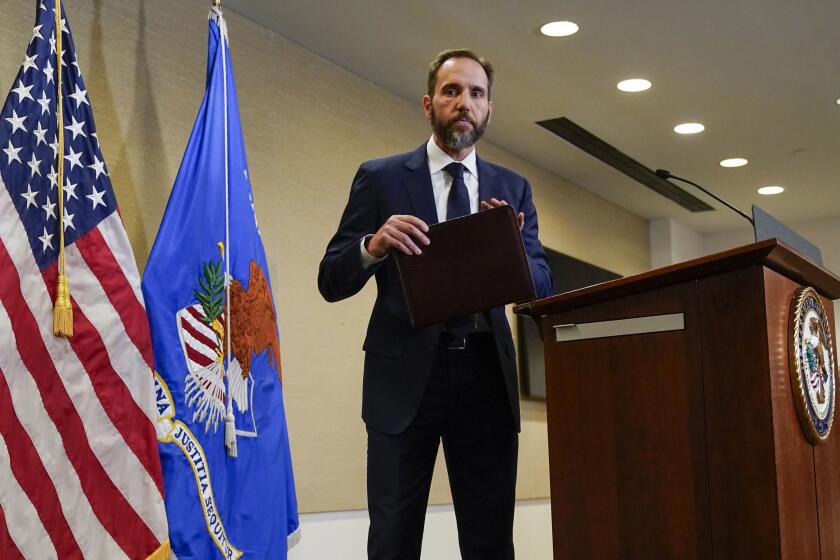Op-Ed: Letâs normalize Trump
âDonât normalize Trump.â Thatâs been a mantra for his critics since he won the Republican nomination. Everyone in Washington recognizes that President Trump is not ânormal.â Some of the ways heâs not normal are good: He has open contempt for âthe swampâ of D.C., its corruption, its polite fictions, its arrogant denizens and their disdain for the choices of ordinary citizens. But he is also a walking rejection of older, more important virtues: separation of powers, the rule of law, the value of truth, the virtue of learned expertise and education, modesty, even simple decency towards oneâs fellow men and women. Heâs a very big bull in a very big china shop, and some of the china is worth saving.
We shouldnât pretend that some of the stranger things Trump does are normal. But heâs not going away anytime soon, and the more normal we can encourage him to be, the better off we all are. Republicans and Democrats alike should try to make this happen.
Trumpâs address to a joint session of Congress proved that he can be normal when he puts his mind to it. His tone was widely viewed as âpresidential,â and much of the speech could easily have been delivered by Barack Obama or George W. Bush with only modest alterations. Yet Trump reverted to abnormal form on Twitter four days later. First, he tweeted about being wiretapped by President Obama, apparently with no basis other than things he read on the Internet. He followed that up by taking a swipe at Arnold Schwarzeneggerâs tenure as host of âThe Apprentice.â That should not have surprised us. At age 70, after four decades in the public eye, Trump is unlikely to change who he is; thereâs no pivot on the horizon. But the more Trump is encouraged to be âState of the Union Trump,â and discouraged from kicking up unnecessary panics and controversies, the better.
Trump thrives on attention, positive or negative; the more his craziest Tweets grab headlines and dominate the conversation, the more heâll turn to his phone.
Trump inner-circle radicals like White House chief strategist Stephen Bannon may see a political advantage in provoking endless, draining controversy. Democrats may calculate that the same dynamic helps them. They might both be right; both Obama and Bill Clinton, after all, capitalized on conflicts that helped the other party capture Congress while painting themselves as their partyâs only hope. But Trump is still the commander in chief, and encouraging his worst instincts while paralyzing the government is bad for the country.
One way to encourage normalcy is to fully staff the administration. Trump is way behind on hiring staff (no sane White House goes a month without a communications director), and the Senate can prioritize confirming those people who get nominated, especially national security and foreign policy appointees. A full bureaucracy will give Trump more briefings, more orders to sign, more decisions to make, and leave him with less time and energy for kicking the beehive.
To clear the air, Senate Republicans and Democrats can also press forward with the Intelligence Committee investigation of Russian involvement in the 2016 election, and ensure a full public report. Public confidence in our democratic system demands a full accounting that defuses conspiracy theories. The endless back-and-forth of anonymous leaks and wild speculation only poisons the climate even further, emboldens the worst instincts and elements on all sides, and breeds mistrust between policymakers and the intelligence community they need to inform them.
Democrats, for their part, should try tamping down the âresistanceâ rhetoric and the lazy Hitler comparisons and try to avoid public panics over every Tweet. Trump thrives on attention, positive or negative; the more his craziest Tweets grab headlines and dominate the conversation, the more heâll turn to his phone for the quick fix of instant public controversy.
The media has a role to play, too. By all means, call out the specific examples of insanity and dishonesty when Trump forces his spokespeople to defend the indefensible, but donât let it swallow coverage of the things the White House is actually doing, many of which are far more important. Get Sean Spicer, the press secretary, talking about things he can explain without âalternative factsâ and that official Washington can debate in ordinary fashion. Remind people that government actually does things and isnât just a reality show.
In encouraging Trump to be normal, Washington need not abandon its usual fault lines. Republicans donât have to give up their big ambitions of using this moment to tame the administrative state. Democrats donât have to stop opposing ordinary Republican priorities they disagree with, like tax cuts. Trumpâs die-hard fans donât have to abandon hope of Trump breaking with bipartisan conventional wisdom on trade, immigration and foreign policy. Those policy debates can and will continue. Trumpâs voters wanted change, and some changes are in order, while others may be half-baked ideas worth stopping.
But the atmosphere of constant crisis and hyperbole is bad for the mental health of the nation and could lead us places we find it hard to return from. Letâs make America normal again.
Dan McLaughlin is an attorney in New York and a contributing columnist to National Review Online.
Follow the Opinion section on Twitter @latimesopinion or Facebook
MORE FROM OPINION
The joke is on voters who trusted Trumpâs healthcare promises
More to Read
A cure for the common opinion
Get thought-provoking perspectives with our weekly newsletter.
You may occasionally receive promotional content from the Los Angeles Times.










